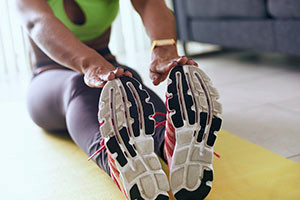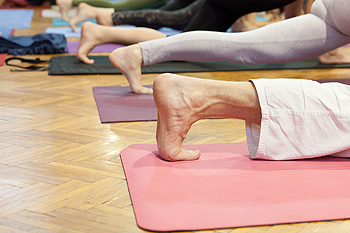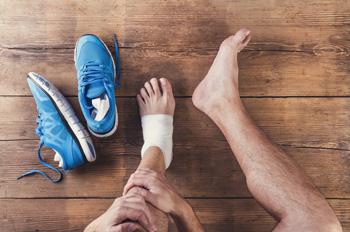June 2020
Eating Properly While Pursuing Running
 Many runners understand the importance of listening to the body, especially in the case of trying to prevent an injury as a result of overuse. Runners who are new to this sport can become injured from running excess miles in the beginning. Additionally, injuries can happen from running at accelerated speeds. It is helpful to drink plenty of water during the day, get an adequate amount of rest, and eat foods that are rich in nutrients. People who enjoy the sport of running often alternate going for a run with cardiovascular exercises, which can include cycling and swimming. If you would like more information about how to prevent running injuries, and how they can impact the feet, please consult with a podiatrist.
Many runners understand the importance of listening to the body, especially in the case of trying to prevent an injury as a result of overuse. Runners who are new to this sport can become injured from running excess miles in the beginning. Additionally, injuries can happen from running at accelerated speeds. It is helpful to drink plenty of water during the day, get an adequate amount of rest, and eat foods that are rich in nutrients. People who enjoy the sport of running often alternate going for a run with cardiovascular exercises, which can include cycling and swimming. If you would like more information about how to prevent running injuries, and how they can impact the feet, please consult with a podiatrist.
Exercising your feet regularly with the proper foot wear is a great way to prevent injuries. If you have any concerns about your feet, contact Dr. Robert Graser of Graser Podiatry and Bunion Surgery Institute. Our doctor will treat your foot and ankle needs.
How to Prevent Running Injuries
Many common running injuries are caused by overuse and overtraining. When the back of the kneecap starts wearing out and starts causing pain in your knee, this is commonly referred to as runner’s knee. Runner’s knee is a decrease in strength in your quadriceps and can occur if you’re not wearing properly fitted or supporting shoes. To prevent runner’s knee, focusing on hip strengthening is a good idea, as well as strengthening your quads to keep the kneecaps aligned.
What Are Some Causes of Running Injuries?
- One cause of a common running injury is called iliotibial band syndrome.
- Plantar fasciitis is also another common injury.
- Stress fractures can occur from overtraining, lack of calcium, or even your running style.
Best Ways to Prevent Running Injuries
- Wear footwear that fits properly and suits your running needs.
- Running shoes are the only protective gear that runners have to safeguard them from injury.
- Make a training schedule. Adding strengthening exercises as well as regular stretching can help keep you strong and limber and can lessen the possibility of injuries.
- Stretching keeps muscles limber; this will help you gain better flexibility.
If you have any questions please feel free to contact our office located in Boerne, . We offer the newest diagnostic and treatment technologies for all your foot and ankle needs.
Daily Foot Care for Diabetic Patients
 Many patients who are diabetic understand the importance of maintaining proper foot care. Diabetes can cause neuropathy, which can lead to the inability to feel cuts and bruises on the feet. It is beneficial to perform daily foot checks that include noticing any abnormalities of the feet, ensuring the feet stay clean, and trimming the toenails correctly. Research has indicated that it can be wise to avoid walking barefoot, in addition to wearing shoes that are specifically made for diabetic patients. When the legs are refrained from being crossed for long periods of time, blood flow may be increased. It is beneficial to practice simple foot stretches during the course of the day, which can consist of flexing the ankles, and wiggling the toes. It is strongly suggested that people who have diabetes are under the care of a podiatrist who can effectively manage this condition.
Many patients who are diabetic understand the importance of maintaining proper foot care. Diabetes can cause neuropathy, which can lead to the inability to feel cuts and bruises on the feet. It is beneficial to perform daily foot checks that include noticing any abnormalities of the feet, ensuring the feet stay clean, and trimming the toenails correctly. Research has indicated that it can be wise to avoid walking barefoot, in addition to wearing shoes that are specifically made for diabetic patients. When the legs are refrained from being crossed for long periods of time, blood flow may be increased. It is beneficial to practice simple foot stretches during the course of the day, which can consist of flexing the ankles, and wiggling the toes. It is strongly suggested that people who have diabetes are under the care of a podiatrist who can effectively manage this condition.
Diabetic foot care is important in preventing foot ailments such as ulcers. If you are suffering from diabetes or have any other concerns about your feet, contact Dr. Robert Graser from Graser Podiatry and Bunion Surgery Institute. Our doctor can provide the care you need to keep you pain-free and on your feet.
Diabetic Foot Care
Diabetes affects millions of people every year. The condition can damage blood vessels in many parts of the body, especially the feet. Because of this, taking care of your feet is essential if you have diabetes, and having a podiatrist help monitor your foot health is highly recommended.
The Importance of Caring for Your Feet
- Routinely inspect your feet for bruises or sores.
- Wear socks that fit your feet comfortably.
- Wear comfortable shoes that provide adequate support.
Patients with diabetes should have their doctor monitor their blood levels, as blood sugar levels play such a huge role in diabetic care. Monitoring these levels on a regular basis is highly advised.
It is always best to inform your healthcare professional of any concerns you may have regarding your feet, especially for diabetic patients. Early treatment and routine foot examinations are keys to maintaining proper health, especially because severe complications can arise if proper treatment is not applied.
If you have any questions please feel free to contact our office located in Boerne, . We offer the newest diagnostic and treatment technologies for all your foot and ankle needs.
Can Stretching the Feet Prevent Foot Injuries?
 The majority of impact the body feels while running is absorbed by the feet. Many people who enjoy running stretch before and after a run is completed, and research has shown it is just as important to perform stretching techniques for the feet. There are a variety of stretches that can be practiced which may help in preventing unwanted foot conditions from developing. These can include stretching the Achilles tendon which is done by standing on a step, and gently lowering one heel at a time. Toe stretches are performed by grabbing a towel with your toes while standing, and this helps to strengthen the entire foot. The sole of the foot can feel better when the plantar fascia is stretched by rolling the foot on a tennis ball. For additional information about the importance of stretching your feet, it is suggested that you consult with a podiatrist.
The majority of impact the body feels while running is absorbed by the feet. Many people who enjoy running stretch before and after a run is completed, and research has shown it is just as important to perform stretching techniques for the feet. There are a variety of stretches that can be practiced which may help in preventing unwanted foot conditions from developing. These can include stretching the Achilles tendon which is done by standing on a step, and gently lowering one heel at a time. Toe stretches are performed by grabbing a towel with your toes while standing, and this helps to strengthen the entire foot. The sole of the foot can feel better when the plantar fascia is stretched by rolling the foot on a tennis ball. For additional information about the importance of stretching your feet, it is suggested that you consult with a podiatrist.
Stretching the feet is a great way to prevent injuries. If you have any concerns with your feet consult with Dr. Robert Graser from Graser Podiatry and Bunion Surgery Institute. Our doctor will assess your condition and provide you with quality foot and ankle treatment.
Stretching the Feet
Being the backbone of the body, the feet carry your entire weight and can easily become overexerted, causing cramps and pain. As with any body part, stretching your feet can serve many benefits. From increasing flexibility to even providing some pain relief, be sure to give your feet a stretch from time to time. This is especially important for athletes or anyone performing aerobic exercises, but anyone experiencing foot pain or is on their feet constantly should also engage in this practice.
Great ways to stretch your feet:
- Crossing one leg over the others and carefully pull your toes back. Do 10-20 repetitions and repeat the process for each foot
- Face a wall with your arms out and hands flat against the wall. Step back with one foot and keep it flat on the floor while moving the other leg forward. Lean towards the wall until you feel a stretch. Hold for 30 seconds and perform 10 repetitions for each foot
- Be sure not to overextend or push your limbs too hard or you could risk pulling or straining your muscle
Individuals who tend to their feet by regular stretching every day should be able to minimize foot pain and prevent new problems from arising.
If you have any questions, please feel free to contact our office located in Boerne, . We offer the newest diagnostic and treatment technologies for all your foot care needs.
Common Symptoms of Foot Ulcers
Ulcers occur whe n deep tissues of the feet become exposed, often due to injuries and cuts on the outer layers of the skin. They can be caused by poorly fitting shoes, spending too much time in bed, or by an injury that pierces the skin. Some symptoms of ulcers include odor, red or inflamed tissue, as well as drainage. There may be some pain present as well, however, pain isn't always felt with a foot ulcer. Developing an ulcer may be more common for patients with diabetes, neuropathy, and vascular disease. To remove the unhealthy tissues and begin wound care, it is recommended that you are under the care of a podiatrist. He or she will be able to prescribe the necessary antibiotics if an infection is present. If you are experiencing foot ulcers, please consult with your local podiatrist.
n deep tissues of the feet become exposed, often due to injuries and cuts on the outer layers of the skin. They can be caused by poorly fitting shoes, spending too much time in bed, or by an injury that pierces the skin. Some symptoms of ulcers include odor, red or inflamed tissue, as well as drainage. There may be some pain present as well, however, pain isn't always felt with a foot ulcer. Developing an ulcer may be more common for patients with diabetes, neuropathy, and vascular disease. To remove the unhealthy tissues and begin wound care, it is recommended that you are under the care of a podiatrist. He or she will be able to prescribe the necessary antibiotics if an infection is present. If you are experiencing foot ulcers, please consult with your local podiatrist.
Wound care is an important part in dealing with diabetes. If you have diabetes and a foot wound or would like more information about wound care for diabetics, consult with Dr. Robert Graser from Graser Podiatry and Bunion Surgery Institute. Our doctor will assess your condition and provide you with quality foot and ankle treatment.
What Is Wound Care?
Wound care is the practice of taking proper care of a wound. This can range from the smallest to the largest of wounds. While everyone can benefit from proper wound care, it is much more important for diabetics. Diabetics often suffer from poor blood circulation which causes wounds to heal much slower than they would in a non-diabetic.
What Is the Importance of Wound Care?
While it may not seem apparent with small ulcers on the foot, for diabetics, any size ulcer can become infected. Diabetics often also suffer from neuropathy, or nerve loss. This means they might not even feel when they have an ulcer on their foot. If the wound becomes severely infected, amputation may be necessary. Therefore, it is of the upmost importance to properly care for any and all foot wounds.
How to Care for Wounds
The best way to care for foot wounds is to prevent them. For diabetics, this means daily inspections of the feet for any signs of abnormalities or ulcers. It is also recommended to see a podiatrist several times a year for a foot inspection. If you do have an ulcer, run the wound under water to clear dirt from the wound; then apply antibiotic ointment to the wound and cover with a bandage. Bandages should be changed daily and keeping pressure off the wound is smart. It is advised to see a podiatrist, who can keep an eye on it.
If you have any questions, please feel free to contact our office located in Boerne, . We offer the newest diagnostic and treatment technologies for all your foot care needs.
Possible Causes for Changes in the Feet During Pregnancy
 There are several physical changes that accompany pregnancy which can possibly lead to foot pain. This may be a result of the increased weight the growing fetus puts on the body, hormonal changes, or from eating foods that have high levels of sodium. Many pregnant women notice it may become difficult to complete daily activities when their feet are swollen. Research has indicated it is beneficial to elevate the feet as often as possible, in addition to performing gentle foot stretches. Comfort can be found when shoes fit properly, and the correct shoe size can be determined when the feet are measured during the day. If you would like additional information about the effects pregnancy can have on the feet, please schedule a consultation with a podiatrist.
There are several physical changes that accompany pregnancy which can possibly lead to foot pain. This may be a result of the increased weight the growing fetus puts on the body, hormonal changes, or from eating foods that have high levels of sodium. Many pregnant women notice it may become difficult to complete daily activities when their feet are swollen. Research has indicated it is beneficial to elevate the feet as often as possible, in addition to performing gentle foot stretches. Comfort can be found when shoes fit properly, and the correct shoe size can be determined when the feet are measured during the day. If you would like additional information about the effects pregnancy can have on the feet, please schedule a consultation with a podiatrist.
Pregnant women with swollen feet can be treated with a variety of different methods that are readily available. For more information about other cures for swollen feet during pregnancy, consult with Dr. Robert Graser from Graser Podiatry and Bunion Surgery Institute. Our doctor will attend to all of your foot and ankle needs.
What Foot Problems Can Arise During Pregnancy?
One problem that can occur is overpronation, which occurs when the arch of the foot flattens and tends to roll inward. This can cause pain and discomfort in your heels while you’re walking or even just standing up, trying to support your baby.
Another problem is edema, or swelling in the extremities. This often affects the feet during pregnancy but tends to occur in the later stages.
How Can I Keep My Feet Healthy During Pregnancy?
- Wearing orthotics can provide extra support for the feet and help distribute weight evenly
- Minimize the amount of time spent walking barefoot
- Wear shoes with good arch support
- Wear shoes that allow for good circulation to the feet
- Elevate feet if you experience swelling
- Massage your feet
- Get regular, light exercise, such as walking, to promote blood circulation to the feet
If you have any questions please feel free to contact our office located in Boerne, . We offer the newest diagnostic and treatment technologies for all your foot and ankle needs.
Blog Archives
- July 2024
- June 2024
- May 2024
- April 2024
- March 2024
- February 2024
- January 2024
- December 2023
- November 2023
- October 2023
- September 2023
- August 2023
- July 2023
- June 2023
- May 2023
- April 2023
- March 2023
- February 2023
- January 2023
- December 2022
- November 2022
- October 2022
- September 2022
- August 2022
- July 2022
- June 2022
- May 2022
- April 2022
- March 2022
- February 2022
- January 2022
- December 2021
- November 2021
- October 2021
- September 2021
- August 2021
- July 2021
- June 2021
- May 2021
- April 2021
- March 2021
- February 2021
- January 2021
- December 2020
- November 2020
- October 2020
- September 2020
- August 2020
- July 2020
- June 2020
- May 2020
- April 2020
- March 2020
- February 2020
- January 2020
- December 2019
- November 2019
- October 2019
- September 2019
- August 2019
- July 2019
- June 2019
- May 2019
- April 2019
- March 2019
- February 2019
- January 2019
- December 2018
- November 2018
- October 2018
- September 2018
- August 2018
- July 2018
- June 2018
- May 2018









